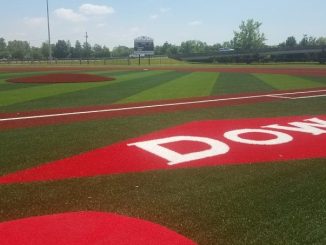
300 locals apply for $10-$18 an hour jobs
Just five years after Hurricane Katrina, southeast Louisiana is facing the possibility of another catastrophe. But this time, it’s man-made.
National, state and local government agencies are focusing all of their efforts on controlling a massive oil spill in the Gulf of Mexico that is dangerously close to destroying Louisiana’s marine life and fishing industry.
Over 300 St. Charles Parish residents have already applied to be a part of the oil clean-up operation, but the state is only looking for about 500 people to hire for temporary positions.
The spill occurred after the oil rig Deepwater Horizon, owned by British Petroleum, exploded in the gulf on April 20 and sank, leaving 11 people missing, presumed dead. Now, the oil line that should have automatically closed during the explosion has malfunctioned, leaking an estimated 210,000 gallons of oil into the gulf each day.
Corey Faucheux, director of economic development and tourism for St. Charles Parish, said that the most obvious impact of the oil leakage to state and local businesses will be to fisheries.
“We’re starting to see signs already,” Faucheux said. “From what I’ve been told, I’m starting to hear stories of seafood prices gradually taking a turn upward.”
But the destruction of the wildlife-rich coast is not the parish’s only fear.
“What has the potential of having the biggest impact here in St. Charles Parish outside of the fisheries is if (officials) close access to the mouth of the Mississippi River,” Faucheux said. “Those businesses that rely on barges and ships that travel up and down the Mississippi River…if they have that access cut off, that has the potential to have a big impact here.”
Faucheux said his department sent surveys to about 1,200 St. Charles Parish businesses on their mailing list on April 30. The survey asked business owners whether they thought there was going to be a physical impact on their business from the oil or if the biggest threat to them was interruption to their businesses. The department is still waiting for the results of that survey.
“Everyone’s keeping a watchful eye. There are many factors with currents and waves and winds – just like a storm,” he said. “There is still a chance that the oil mass might migrate a little further westward, which would put us maybe more at risk.”
Parish President V.J. St. Pierre said that although St. Charles is not one of the parishes expected to be directly hit by the oil slick, the parish has still made back-up plans.
“We are not directly in the affected area, although we want to have some back-up plans in case there is a possibility of us getting some oil. The sites we would have to actually boom off would be on the west bank on Lake Salvador,” he said.
St. Pierre said that an emergency meeting was called in Baton Rouge on May 1 for all parish presidents, sheriffs and emergency operations personnel.
“They asked us to submit our plans by Sunday at 1 p.m. for how to protect our parish,” St. Pierre said. “(The state) wants to submit every parish’s plan at one time then the state can go to BP and say ‘This is our plan, this is what it’s going to cost, we expect you to fund it.’”
St. Pierre and Council Chairman Billy Raymond Sr. also took part in a conference call to President Barack Obama.
“(President Obama) said he realized what we’re going through right now will be a long-term event,” St. Pierre said.
He said that the President promised to spare no expense in stopping the leak, provide every resource at the government’s disposal to help and to make sure that local government is included in any clean-up plans.
As far as clean-up missions, BP and government officials have put up oil booms around the areas most likely to be affected by the spill. Chemicals to break down the oil and controlled burns have also been used.
Nicky Armstrong, with the Business and Career Solutions Center in Luling, said the center is currently focusing on taking applications for some 500 clean-up jobs available in Louisiana. The general labor and supervisory positions will pay anywhere from $10 to $18 per hour and are open to everyone. Pay will be dependent on experience.
“Tons of people have come in. We’ve seen a lot of activity from this,” Armstrong said. “We had people actually lining up at the door trying to get to apply for these positions.
“We are hoping they will get these individuals gainfully employed quickly.”
The Louisiana Workforce Commission said that while they are focusing on the 500 temporary jobs that are available to help contain the oil spill, more companies are coming in looking to hire.
In order to apply for one of the oil clean-up positions, Armstrong said applicants will need to contact their local job center and bring two forms of identification: a driver’s license and a social security card.
Ryan Lambert, a Luling native who owns Cajun Fishing Adventures in Buras, La., said that the oil spill has already seriously affected his business.
“They’ve got half our fishing shut down on the east side and if the oil gets around the southwest pass, we’ll be done,” Lambert said.
Lambert’s business specializes in fishing and duck hunting services. He said that his fishing business may not be the only part affected.
“If they don’t get the oil stopped and cleaned up before the ducks come up, it will be a catastrophic nightmare on the Mississippi Flyway,” he said.
Despite the fact that Lambert is also a board member for the Louisiana Charter Boats Association, he said that the clean-up officials have not contacted him at all.
Lambert said that he tried to contact officials, but was told that he would have to file a claim and was not told much else.
Lambert’s boats are not the type that officials are looking for to help with the clean-up, but Lambert said that clean-up efforts will be pointless if the leak is not capped off.
“I’m one of the biggest players in this game – one of the biggest charter businesses in the state,” he said. “Worst case scenario, if it leaks for three months we will be out of the fishing business for years. For now we’re still fishing on the west side of the river and hoping for the best.
“Everybody’s in the same boat. It’s bigger than all of us. It’s like Katrina – you can’t say until it hits how much it’s going to affect us.”
If you encounter oiled wildlife, please call 1-800-557-1401. Officials have asked people not to touch or disturb oiled wildlife for safety reasons.
To report areas with oil ashore or to leave contact information to volunteer in the affected areas, call 1-866-448-5816.




Be the first to comment